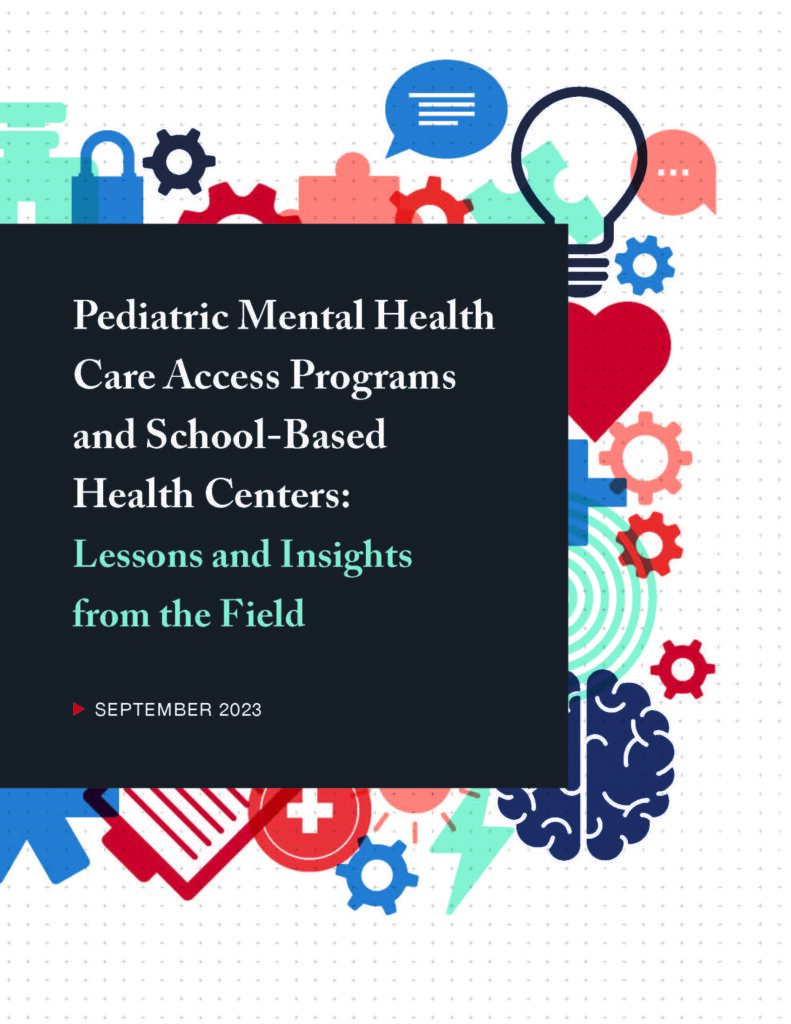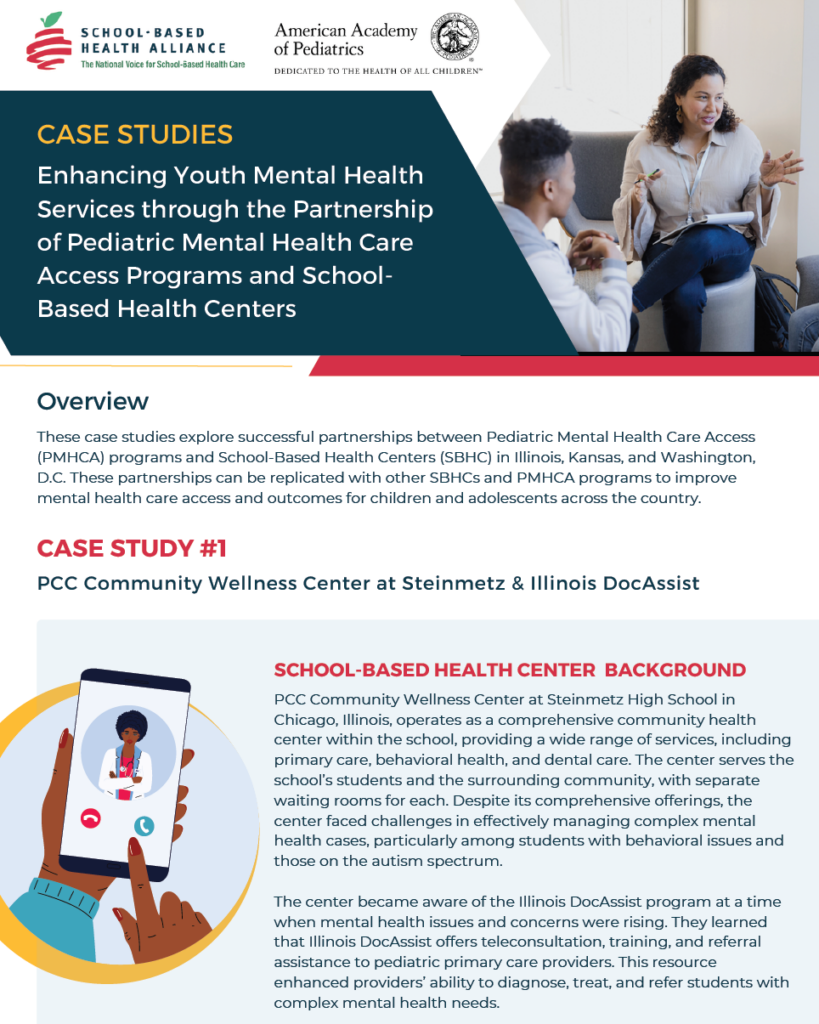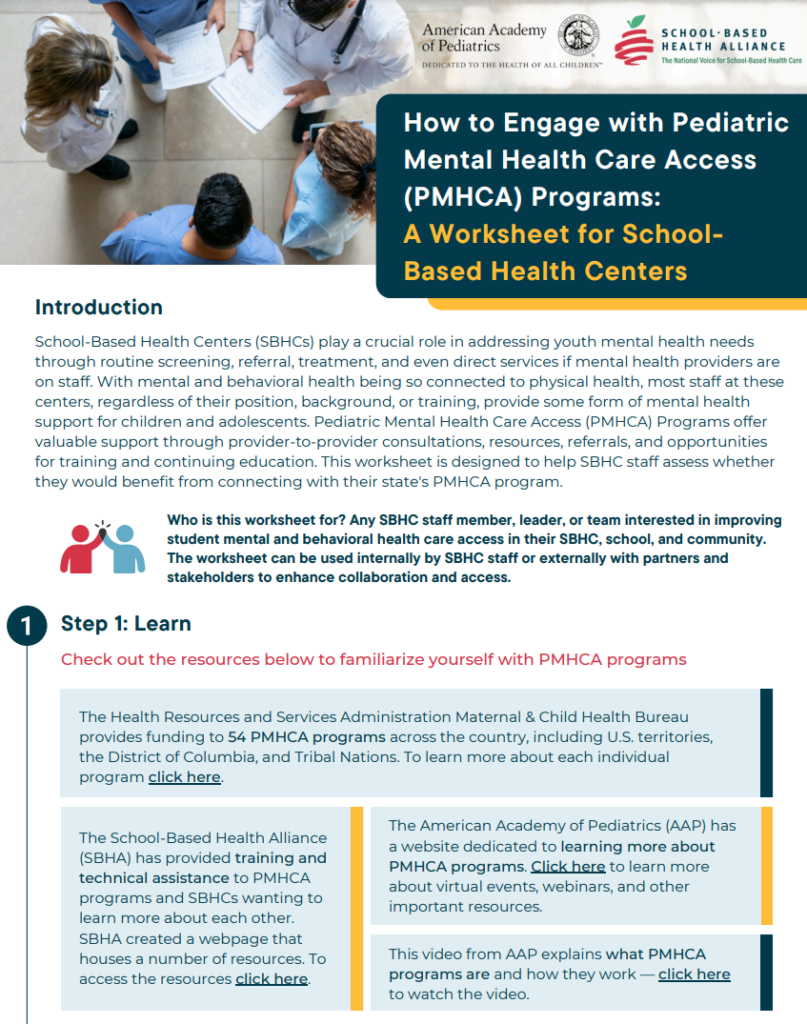Pediatric Mental Health Care Access (PMHCA) Programs: Partnerships with Schools and SBHCs
Pediatric Mental Health Care Access (PMHCA) programs expand access to mental health care for youth by building the capacity of primary care providers to diagnose, treat, and refer youth with mental health conditions. PMHCA programs’ statewide teleconsultation, training, resources, and referral services are designed to mitigate workforce shortages of psychiatrists during the rising children’s mental health crisis. In recognition of SBHCs as an established model of healthcare that already offers integrated health and behavioral services, the School-Based Health Alliance (SBHA) was funded by the Health Resources and Services Administration (HRSA) to provide technical assistance to PMHCA programs as they expand to school settings.
The following resources were developed to support PMHCA programs as they explore expanding and enhancing their services to schools and SBHCs.
PMHCA Programs and SBHCs
The following two documents framed for different audiences describe the common and complementary characteristics of PMHCA programs and SBHCs, what can be accomplished through partnership, and the steps to initiate a partnership.
- For PMHCA Programs: “Pediatric Mental Health Care Access (PMHCA) Programs and School-Based Health Centers (SBHCs): A Natural Partnership for Improving Access to Mental Health”
- For SBHCs: “School-Based Health Centers (SBHCs) and Pediatric Mental Health Care Access (PMHCA) Programs: A Natural Partnership for Improving Access to Mental Health”
After activities designed for PMHCA programs to learn and share about various forms of SBHC collaboration, SBHA developed “PMHCA Programs and SBHCs: Lessons and Insights from the Field,” which summarizes lessons, insights, and innovation from PMHCA programs that are establishing partnerships with SBHCs. With input from an advisory group of diverse PMHCA program champions with established connections to SBHCs, this is a first-of-its-kind resource for PMHCA programs that are considering expanding to SBHCs, as well as those that are already collaborating with SBHCs and want to enhance their services.

SBHA worked with the American Academy of Pediatrics(AAP) to develop two resources for school-based health centers to learn more about what a partnership could look like with their state’s PMHCA program and how to assess whether their SBHC may be interested in engaging with their state’s PMHCA program. Check out the resources below:

Case Studies on SBHC and PMHCA Partnerships
This document presents case studies showcasing successful partnerships between School-Based Health Centers (SBHCs) and Pediatric Mental Health Care Access (PMHCA) programs in Illinois, Washington DC, and Kansas. It highlights the impact of these collaborations on improving mental health access and outcomes for students, with examples of effective diagnosis, treatment, and culturally competent care.

SBHC Checklist and Worksheet for Engaging PMHCA Programs
This worksheet provides a step-by-step guide for School-Based Health Centers to assess and enhance their engagement with PMHCA programs. It includes checklists and reflection questions to help SBHC staff evaluate their current mental health resources, identify needs, and establish stronger connections with state and national PMHCA resources for training, consultation, and referral support.
The following 60-minute webinar, featuring subject matter expert presenters Laura Hurwitz, LCSW; Sarah Rosadini, B.A.; Rebecca Gostlin, LPC; and Petra Steinbuchel, M.D.; explores the benefits of collaboration between PMHCA programs and SBHCs and offers insights into building sustainable partnerships. Viewers will learn valuable lessons from the field and discover how two states, California and Colorado, each at different stages of partnership, are approaching collaboration between their PMHCA programs and SBHCs.
PMHCA Programs and Schools
“Guidelines and Considerations for PMHCA School Expansion” provides an overview of the current school mental health landscape, highlights opportunities for collaboration between PMHCA programs and schools, and offers guidelines and considerations for programs exploring expansion into schools.
“Pediatric Mental Health Care Access Playbook for Training and Education to School-Based Audiences” describes best practices and opportunities for PMHCA programs to deliver training and education to school and district teams. The playbook provides a series of steps to develop or adapt training and education for school audiences and offers training formats, topics, and audiences.
The following webinar, featuring Dr. Jill Bohnenkamp and Dr. Kathryn Trainor, faculty from the National Center for School Mental Health, describes opportunities and considerations for PMHCA programs exploring expansion into schools. It features practical tips and resources for assessing PMHCA readiness and school and district mental health needs as well as how to offer training and education for school audiences.
Guidelines and Considerations for Expanding into School Settings Webinar
HIPAA, FERPA, and School Health: Confidentiality and Information Sharing in School-Based Health Care
PMHCA programs partnering with SBHCs and/or schools can improve their support and consultation to SBHCs and schools by understanding which confidentiality laws apply to information related to students about whom they are consulting. Depending on the type of information and who initiated and controls it, different federal laws may apply. A critical question is whether the information is subject to the Family Educational Rights and Privacy Act (FERPA) or the Health Insurance Portability and Accountability Act of 1996 (HIPAA) Privacy Rule.
In partnership with the National Center for Youth Law, SBHA has created resources to guide both PMHCA programs and SBHCs in navigating federal privacy laws.
Additional Resources
- HIPAA + FERPA – Key Considerations for SBHCs
- HIPAA + FERPA – What PMCHAs working with SBHCs Need to Know
- Information Sharing and Confidentiality Protection in SBHCs – A Resource Guide to HIPAA and FERPA
- TAIC – Training and Capacity Building Webinar – Adaptations and Considerations for PMHCA Program Expansion into SBHCs | JBS International, Inc.